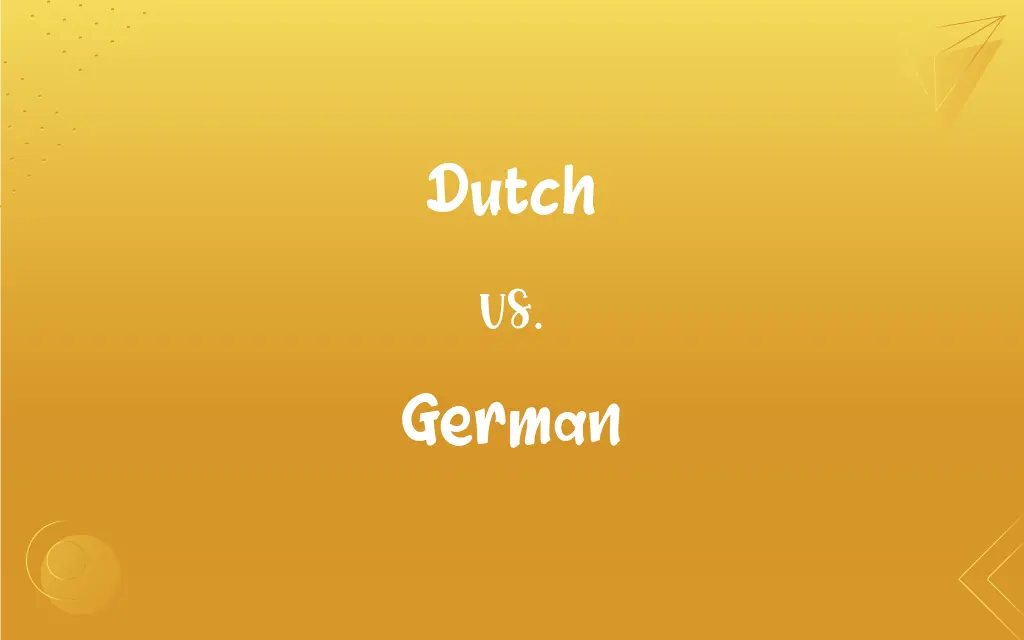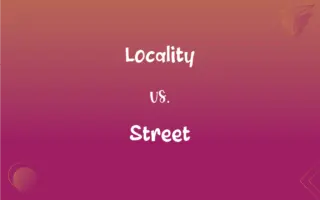Dutch vs. German: What's the Difference?
Edited by Aimie Carlson || By Janet White || Published on November 9, 2023
"Dutch" relates to the Netherlands or its language, while "German" pertains to Germany or its language.

Key Differences
"Dutch" refers to anything associated with the Netherlands, its people, or language, whereas "German" pertains to elements connected with Germany, including its inhabitants and their spoken language.
The "Dutch" language, spoken in the Netherlands, has its own grammatical structure and vocabulary, distinct from "German," the language of Germany, which has its own unique grammar and lexicon.
"Dutch" culture, embodying the traditions and social behaviors of the Netherlands, differs significantly from "German" culture, which encompasses the societal norms and customs prevalent in Germany.
"Dutch" cuisine, known for its own specialties like stroopwafels and herring, is quite different from "German" cuisine, which is famous for dishes such as bratwurst and sauerkraut.
The "Dutch" landscape, characterized by tulip fields and windmills, varies greatly from the "German" landscape, known for its dense forests and mountain ranges.
ADVERTISEMENT
Comparison Chart
Language Family
Germanic
Germanic
Country
Netherlands
Germany
Grammar
Own set of grammatical rules
Distinct grammatical structure
Cultural Expressions
Known for art, cycling, and canals
Noted for music, cars, and beer
Typical Cuisine
Cheese, herring, stroopwafels
Sausages, pretzels, sauerkraut
ADVERTISEMENT
Dutch and German Definitions
Dutch
Language
She speaks Dutch fluently.
German
Culture
German classical music is celebrated globally.
Dutch
Nationality
He is Dutch, hailing from the Netherlands.
German
Cuisine
German beer is enjoyed by many.
Dutch
Culture
Dutch paintings are remarkably detailed.
German
Language
He is fluent in German.
Dutch
Of or relating to the Netherlands or its people or culture.
German
Nationality
She is German, born in Berlin.
Dutch
Of or relating to the Dutch language.
German
Of, relating to, or characteristic of Germany or its people.
Dutch
German.
German
Of or relating to the German language.
Dutch
Of or relating to any of the Germanic peoples or languages.
German
A native or inhabitant of Germany.
Dutch
Of or relating to the Pennsylvania Dutch.
German
A person of German ancestry.
Dutch
The people of the Netherlands.
German
Any of the West Germanic languages and dialects spoken or originating in Germany, Austria, or Switzerland, especially standard High German.
Dutch
(Archaic) A Germanic people.
German
Having the same mother and father; a full (brother or sister).
Dutch
The Pennsylvania Dutch.
German
Being born to one’s blood aunt or uncle, a first (cousin).
Dutch
The official West Germanic language of the Netherlands and one of the official languages of Belgium.
German
(obsolete) Closely related, akin.
Dutch
(Archaic) One or more of the West Germanic languages of Germany, Switzerland, and the Low Countries.
German
(obsolete) A near relative.
Dutch
See Pennsylvania Dutch.
German
An elaborate round dance, often with a waltz movement.
Dutch
(Slang) Anger or temper.
German
A social party at which the german is danced.
Dutch
(slang) wife
German
Nearly related; closely akin.
Wert thou a leopard, thou wert german to the lion.
Dutch
Pertaining to Holland, or to its inhabitants.
Germany is slandered to have sent none to this war [the Crusades] at this first voyage; and that other pilgrims, passing through that country, were mocked by the Dutch, and called fools for their pains.
German
Of or pertaining to Germany.
Dutch
The people of Holland; Dutchmen.
German
A native or one of the people of Germany.
Dutch
The language spoken in Holland.
German
The German language.
Dutch
The people of the Netherlands;
The Dutch are famous for their tulips
German
A round dance, often with a waltz movement, abounding in capriciosly involved figures.
Dutch
The West Germanic language of the Netherlands
German
A person of German nationality
Dutch
Of or relating to the Netherlands or its people or culture;
Dutch painting
Dutch painters
German
The standard German language; developed historically from West Germanic
Dutch
Cuisine
Dutch cheese is famous worldwide.
German
Of or pertaining to or characteristic of Germany or its people or language;
German philosophers
German universities
German literature
Dutch
Geography
The Dutch countryside is known for its windmills and tulips.
German
Of a more or less German nature; somewhat German;
Germanic peoples
His Germanic nature
Formidable volumes Teutonic in their thoroughness
German
Geography
The German landscape includes the famous Black Forest.
FAQs
Is "Dutch" a language and a nationality?
Yes, it refers to both the people of the Netherlands and their language.
Is German spoken in other countries besides Germany?
Yes, it's also an official language in Austria, Belgium, Liechtenstein, and Luxembourg.
What's a common cultural event in Germany?
Oktoberfest is a well-known German festival.
What does "German" refer to?
It pertains to anything related to Germany, its people, or language.
Are Dutch and German languages similar?
They have similarities but are distinct languages with their own grammar and vocabulary.
What are some traditional Dutch foods?
Foods like stroopwafels, herring, and Gouda cheese are traditional Dutch.
Are there different dialects of Dutch?
Yes, there are regional dialects in the Netherlands.
Are Dutch and German both Germanic languages?
Yes, both are part of the West Germanic language family.
Is Dutch only spoken in the Netherlands?
Primarily, but also in some parts of Belgium and Suriname.
What are some famous German dishes?
Dishes like bratwurst, schnitzel, and sauerkraut are quintessentially German.
What's a renowned German landmark?
The Brandenburg Gate is a national symbol.
What are some German art contributions?
German Expressionism is a significant movement.
What's a famous Dutch landmark?
The windmills of Kinderdijk are iconic.
Is German a global language?
It's one of the most widely spoken languages in Europe and holds significant cultural and economic influence.
What landscapes are common in Germany?
Forests, rivers, and mountain ranges in the south.
Are there different forms of German?
Yes, including High German and Low German, with various regional dialects.
What is Germany known for?
Among other things, its technological innovations, cars, and classical music.
Is Dutch known for any art movements?
Yes, notably the Dutch Golden Age of painting.
What's a typical Dutch scenery?
Flat landscapes, canals, and tulip fields.
Does Dutch have global influence?
It's more regionally influential, though the Netherlands is prominent in international trade and law.
About Author
Written by
Janet WhiteJanet White has been an esteemed writer and blogger for Difference Wiki. Holding a Master's degree in Science and Medical Journalism from the prestigious Boston University, she has consistently demonstrated her expertise and passion for her field. When she's not immersed in her work, Janet relishes her time exercising, delving into a good book, and cherishing moments with friends and family.
Edited by
Aimie CarlsonAimie Carlson, holding a master's degree in English literature, is a fervent English language enthusiast. She lends her writing talents to Difference Wiki, a prominent website that specializes in comparisons, offering readers insightful analyses that both captivate and inform.































































